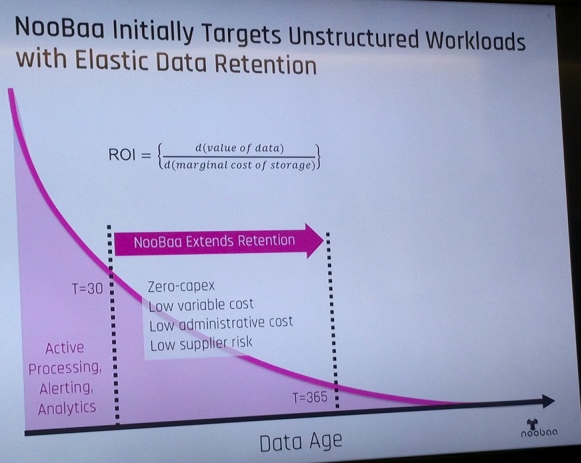Israeli Start-Up Noobaa With Simple Scalable S3 Storage for Masses
Software-defined storage philosophy dedicated to unstructured data
By Philippe Nicolas | June 28, 2016 at 3:27 pm This article was posted on June 24, 2016 on the blog of Philippe Nicolas who worked at SGI, Veritas, Symantec, Brocade and Scality, and is currently advisor for OpenIO, Infinit, Rozo Systems, Guardtime, and Solix Technologies.
This article was posted on June 24, 2016 on the blog of Philippe Nicolas who worked at SGI, Veritas, Symantec, Brocade and Scality, and is currently advisor for OpenIO, Infinit, Rozo Systems, Guardtime, and Solix Technologies.
Noobaa super simple scalable S3 storage for masses
NooBaa, Inc., a new storage Israeli ISV, continues its incremental visibility effort on the market.
I had the privilege to meet Yuval Dimnik, CEO and co-founder, and Mike Davis, CMO, a few days ago in Palo Alto for a briefing. The first feeling I had was great as they plan to introduce a real new storage animal to the market. Let me summarize what I learned without telling any secret as the web site already exists.
First, NooBaa has a strong DNA in storage and networking with many leaders having worked for Exanet, NooBaa’s CEO and Guy Margalit, CTO, have worked there. The company, today with approximately 15 people and a HQ in Boston and R&D center in Rehovot in Israel, was founded in 2013 and is backed by JVP, OurCrowd and some industry leaders for an unknown amount. OurCrowd has ingested $934,504. [On crowdability, you can read that the Israeli firm raised $2.30 million and has a valuation of $15 million. On this web site it is offered a minimum of $10,000 investment into the company. Editor]
The product they design and develop belongs to the object storage category with key differentiators, it is a full SDS philosophy dedicated to unstructured data.
NooBaa product is a pure software approach, offering only S3 interface running on any compute resource available anywhere supporting heterogeneous network-driven and shared storage entities. The product offers also de-dupe with a sliding window technique, compression, encryption and replication to protect data with by default three copies.
Erasure coding is on the roadmap.
NooBaa uses a asymmetric model with side metadata servers and data servers acting as chunk servers. Metadata servers use MongoDB.
The demo the team has made was super efficient having demonstrated how it is easy and fast to deploy, run and operate. Just 15mn and we played with the system, ingest some data, stream a video.
The pricing has two modes: Freemium and then a pay-per-user subscription base on real used capacity (real capacity for one data copy).
The product is in beta mode and should be GA early 2017.
Great first feeling with the team and a super promising product, lots of potential and real interesting ideas.















 Subscribe to our free daily newsletter
Subscribe to our free daily newsletter

